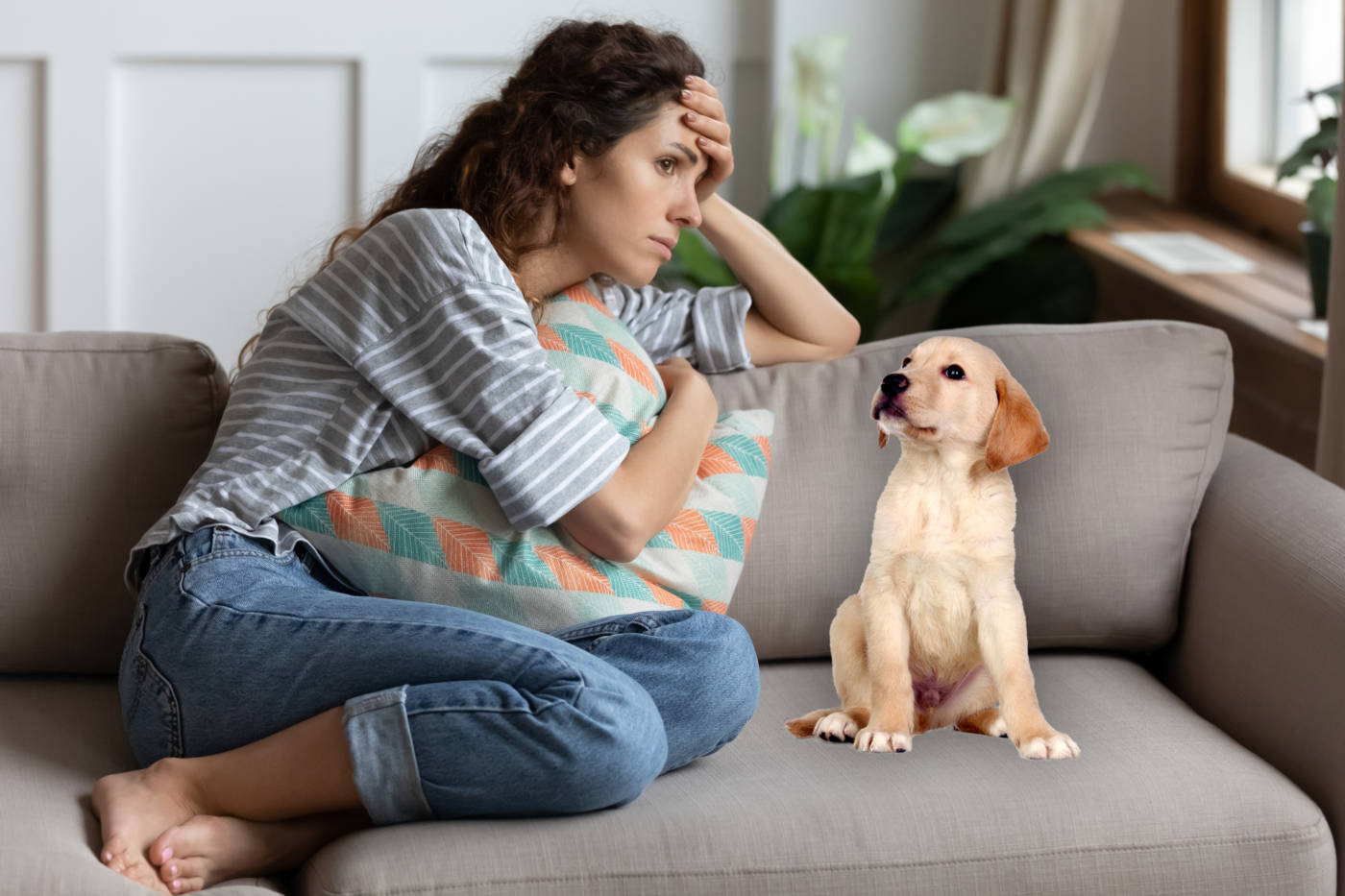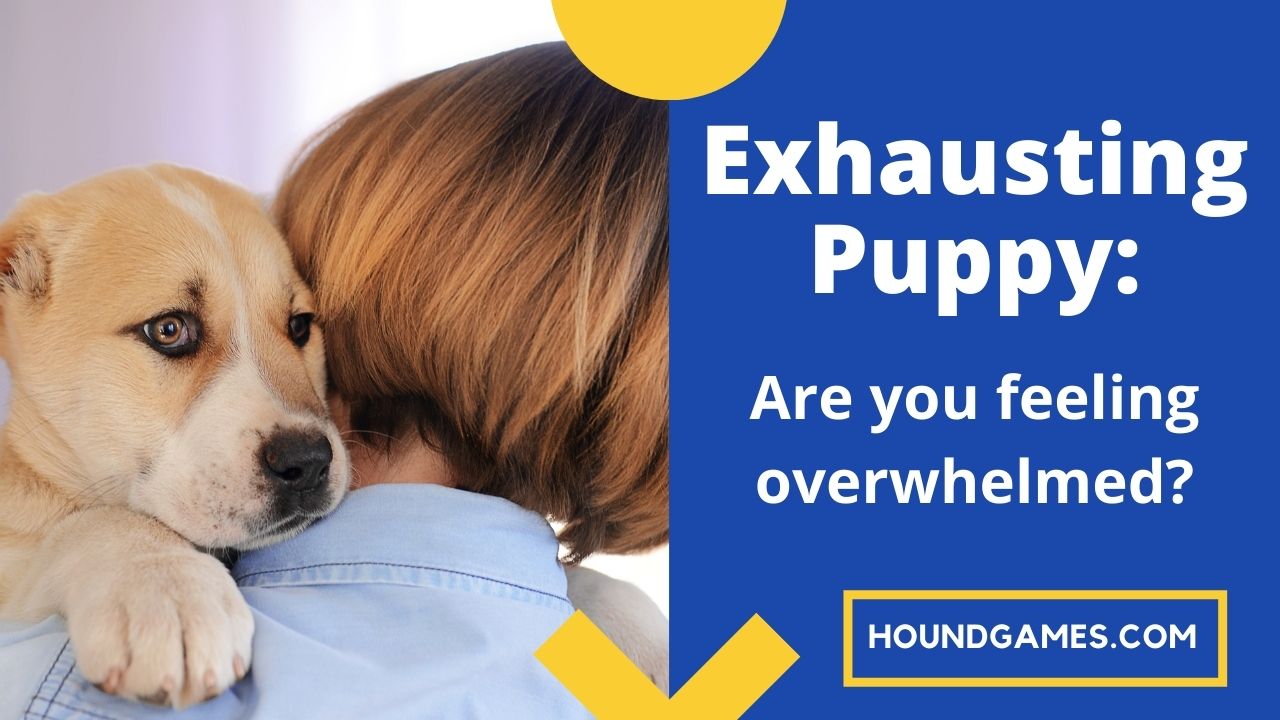If you’re feeling overwhelmed and mentally exhausted while raising your puppy, you are not alone. Plenty of dog owners – myself included – have experienced the “puppy blues.” There’s no doubt about it, puppies can make you feel exhausted, depressed, and definitely overwhelmed.
Knowing why this occurs, and why puppies can be just so exhausting and stressful, can help you cope with the feelings you’re experiencing.

Is it normal to be exhausted with a puppy?
Yes. Puppies can be absolutely exhausting, especially if you are not prepared or used to the time and energy puppies take to raise. Even those of us who are professionals can feel tired at times!
First, having a new puppy is a big life change. If you are going from a home without dogs to a home with a puppy, the changes can be even greater.
Not all puppies sleep through the night, so you may be exhausted simply from the interruptions to your sleep schedule, as your puppy is potty trained and learns to hold their bladder until morning.
You’ve also got an abundance of new things to worry about that you didn’t before. Puppies are excellent at finding every possible cord, sharp object, and other dangerous things you might have around your home.
Plus, there are all the extra things you’re now doing with your time and energy, such as attending puppy classes, ensuring your puppy gets the appropriate exercise, socializing your puppy, feeding them, cleaning accidents, fending off the puppy biting… the list goes on and on!
Good preparation and a solid understanding of what to expect when raising a puppy can go a long way in ensuring you get the rest you need to avoid exhaustion.
However, even the best of planning can’t account for everything, or make up for the fact that there are changes in your life and schedule now. The truth is puppies need a lot of time and attention.
While puppies and human infants are not the same, there can be similarities in that both can cause interruptions to your sleep schedule, both require heavy supervision and can easily end up in dangerous situations, and both are living beings that you care about.
We often expect new moms to receive breaks in caring for their infants while a friend, family member, or child care professional takes over. I’m sure you’ve known a new mother to enjoy spending this time napping and resting!
If you’re finding yourself simply exhausted by a new puppy, consider asking a friend or family member you trust to help out and watch the puppy. You likely need a break and there’s nothing wrong with that. It’s normal!
Having a day to catch up on sleep, household chores, and just not worry about what the puppy is doing at that moment can be a great way to overcome new puppy exhaustion and the puppy blues.
You may even feel like you regret getting a puppy and if that’s the case then be sure to read our post about it.
It’s important that you find time for yourself, and one way of doing this is by setting up a good playpen for your pup. You can find more information about this in our post Choosing a Dog Pen: Complete Guide (Size and Type).
Is it normal to be overwhelmed by a new puppy?
Just as with exhaustion, it’s normal to be overwhelmed with a new puppy, too. Plus, being overwhelmed can occur no matter how much preparation you’ve done.
In fact, I sometimes feel that I am more overwhelmed raising a puppy as a professional dog trainer, because I know all about what should and shouldn’t be done.
Too much information can be just as overwhelming as too little! Both can lead to a paralysis of sorts, where deciding what to do is just overwhelming.
Even if you’ve done all your research, it often turns out that the puppy you brought home has failed to read the same books as you, and throws the occasional curve ball (or two… or ten).
If you’re feeling overwhelmed because of all the things you want to train your puppy to do, or all the socialization you want to accomplish, consider this: you have a lifetime with your dog ahead of you.
Yes, it’s important to focus on socialization when your puppy is young. Yes, you want to instill good manners from the start.
However, you shouldn’t be focusing on either of these at the detriment of your own mental health. Your needs matter, too!
Instead of worrying about checking off every person, place, and thing that you want to socialize your puppy to, focus on the experiences being good socialization experiences.
Tossing your puppy in a bunch of new situations for the sake of socialization can do more harm than good. Rather, if you calmly and carefully expose your puppy to a variety of people, places, and things, you’ll set them up to handle novel experiences in the future, too.
With socialization, it’s often absolutely a case of quality over quantity.
Meet a few dogs you know and trust. Go a few places, play on a few types of equipment, and experience a few types of sounds.
Good experiences with variety will still be an effective way to socialize your puppy without causing you to be overwhelmed. Especially when a socialization checklist often feels like you need to finish the entire thing or your dog will be a nervous wreck as an adult.
Genetics matter, too. The entire fate of your puppy’s future does not rest entirely in your hands and the socialization and training you do with your puppy.
Again, being overwhelmed by your new puppy is normal and don’t be hard on yourself.
We have some resources that might help you cope throughout this period. I’d like to reassure you that your puppy won’t be this difficult forever. They do calm down and become easier as they integrate into your life.
We highly recommend using our snuffle mat to help burn some mental energy off. Foraging work is a great way to keep a busy little pup occupied.
If you’re finding your puppy is a handful due to being clingy, then you should read our post Puppy Separation Anxiety: A Complete Guide
This post may also be helpful: Calm Down a Crazy Puppy the Right Way: (Hyper Zoomies)
Another one that could be useful is knowing how much attention your puppy needs at each age interval. So this post could also help you Giving Puppies Attention: (3, 6, and 12-months)
Is your puppy making you depressed?
The stress that comes with raising a happy and healthy puppy, and the mental exhaustion that’s often associated with it, can certainly lend itself towards creating feelings of depression.
This is especially the case if you have struggled with depression in the past, or have a family history of depression.
Some things may get better with time, especially as you no longer have to deal with potty training accidents or chewed up belongings.
Depending on your individual situation, though, you may be dealing with more long-term problems and stressors.
One situation that comes to mind is where a new owner has acquired a dog with goals in mind – goals to do sports, or work a specific job, or just be a wonderful family pet – and then found out the puppy will not be suitable for those goals.
Whether a glaring temperament concern, or a health problem that prevents them from being the dog you had hoped for, puppy owners may experience feelings of grief over the life they had planned for their puppy that can no longer exist.
I personally experienced a situation where I brought home a long-awaited puppy, with the plan to raise the puppy to be the best training and competition partner they could be. Unfortunately, only a few days after I had brought the puppy home, we discovered the puppy had a medical problem that would greatly affect their quality of life and could not be treated.
How attached could I be, only a few days after having this puppy in my life? A lot, it turns out.
Not only was I dealing with the grief and sadness of losing the puppy (and my hopes for our future together), but I had a variety of stressors in my personal life that made it harder to handle this one.
Several family members I was close to had passed away suddenly in the month or two prior, and my now-husband had moved out of state for work, meaning I was also navigating a new long-distance relationship.
We don’t live our lives in a bubble. The stressors that a new puppy presents are not separate from any other stressors in our lives. Sometimes, they add up to a point where we need to seek help.
I had started medication for depression the week before I brought my puppy home, since I already needed help managing my mental health. I had also started visiting a grief counselor to work through the loss of my family members.
I am incredibly thankful to have started to create this network of help and support so that I could lean on it when it became apparent that this puppy and I would not be together long.
Shortly after, the “stars aligned” and I ended up with Windi, my current oldest dog. Having a new puppy to focus on building a future with, as well as coping strategies from therapy sessions and the onset of the effectiveness of my new medication, were critical to my healing.
You may have something similar going on with your puppy – grieving the “what could’ve been”. You might also be struggling with the loss of free time to engage in hobbies, or the social gatherings that you’ve skipped because puppies need bathroom breaks.
No matter the reason, it’s valid to sometimes feel depressed when raising your puppy. Depression is not something we can actively control and decide whether or not we feel “happy” or “sad.”
If you’re struggling with feelings of anxiety or depression, please seek help. Take it from me and my own experiences – when the depression is weighing heavily, outside help can be a huge step towards feeling better.
You might also like to read our post Does Your Dog Care When You Cry?
Or if you’re not enjoying your puppy and finding yourself just not bonding with them, you may also want to read this post: I hate my puppy, will I ever love them?
Puppy Blues – New puppy stress syndrome
The stress, exhaustion, and sometimes misery, associated with new puppies is often called the “puppy blues” or “new puppy stress syndrome.” No matter what label you give it, it’s certainly something that affects enough puppy owners to warrant talking about it!
Puppy Blues Symptoms
How do you know if you have the puppy blues? Well, there’s no set definition or medical diagnosis – it’s simply a term used to refer to the overwhelm and mental exhaustion of life with a new puppy.
Puppy owners commonly report experiencing:
- Feelings of sadness, hopelessness, or depression
- Overwhelming anxiety
- Wishing you had not acquired your puppy
- Resentment towards your puppy
- And an increase in irritability or arguments
This is not an exhaustive list. We all experience stress, anxiety, and overwhelm in different ways.
You also don’t need to experience a symptom at every moment throughout the day. You can have a case of the puppy blues and still enjoy your puppy.
You might like to read our post How Long For a Puppy to Know You… (Revealed), which is about how long it takes for a puppy to bond with you.
Severe Puppy Blues
If you’re finding that your mental or physical health is suffering greatly, and that your puppy is too much, it’s important to recognize that you need help.
First off, consider reaching out to someone you can talk with – either a trusted friend or a counselor. Therapy is NEVER something you should be ashamed of, even if the reason you’re going is because of a puppy. If you’re feeling mentally exhausted and depressed, then you have a legitimate concern.
Secondly, if you are really struggling with feelings of resentment towards your puppy and regret that you have them, it’s valid to consider that the puppy may not be the best fit for you. It doesn’t make you a bad person.
Rehoming a dog that doesn’t fit with your life is a completely valid choice. You not only have to consider the dog’s health and well-being, but your own.
If you are already having serious doubts about the ability to live happily with your dog in the future, especially if you’re seeing aggressive behaviors, extreme fear, health problems, or other concerns, you should consider if it’s really the puppy blues talking or if the puppy you have is just not a good fit.
If you purchased the puppy from a responsible breeder, you should talk with them about your concerns. Otherwise, if you don’t have that support from a breeder (or even if you do), seeking out behavior and/or veterinary professionals can help you decide if the puppy is likely to improve, or if the problems will persist.
Many dog owners vilify rehoming of pets. However, there are plenty of ways to responsibly rehome an animal if you decide to do so. If the puppy is already causing stress in your life that it’s affected you severely, is that something you want to deal with for the next decade?
Of course, many problems (puppy biting, potty training, etc) will go away with training and age. But, severe aggression or fear in puppies, as well as some other health or behavior concerns, is likely a part of their genetics and will be hard to overcome.
New Puppy Stress Syndrome
Another name for the puppy blues is New Puppy Stress Syndrome. As with the puppy blues, this is not an official medical diagnosis and is not more or less severe than the puppy blues.
Instead, New Puppy Stress Syndrome is simply another phrase that some use to describe the period where you are stressed and overwhelmed on occasion with your new dog.
Referring to these feelings as the puppy blues is more popular than calling it New Puppy Stress Syndrome, but you may sometimes find information from others calling it by that name.
I’d also like to say that it’s ok to get upset with your puppy sometimes. It’s how you manage your emotions around them when things aren’t going to plan that’s important. For more information on this you can read our post, Getting Mad at Your Dog: Everything to know
How to cope with a new puppy
The best way to cope with a new puppy is to set yourself up for success. Plan, prepare, and develop a solid understanding of what raising a puppy takes.
Also, remember that it’s not all doom and gloom! While this article might feel heavy and that raising a puppy is always a bad experience, that’s not the case.
Most of the time, owners only experience brief moments of the puppy blues, such as the day they have to clean up a lot of accidents and are late for work. Or the day after your puppy decided they’d stay up all night crying.
Some owners never experience the puppy blues at all!
The puppy blues also rarely last long-term. When I got my youngest dog, he was just shy of 7 months old. He was a full-on teenager puppy, and made it very clear he did not want to be left alone or behind any sort of barrier.
The first night, after trying varying set ups to get him to sleep, I ended up finally falling asleep on the floor, in a hallway, with doors closed and a baby gate set up to make sure the puppy couldn’t get into anything that would be harmful.
In the middle of the night, I vividly remember waking up, looking at the puppy sleeping at my head, and thinking about how this might all be fine after all.
My puppy took that moment to slap my eyeball with his paw in play, as if to say “just you wait, the puppy blues aren’t over yet.”
We did come to a better relationship by the end of the first week, though. After a little time to settle into a routine and understand each other, I no longer had regrets about adding him to my household.
The typical puppy blues should be short lived, and not constant. If you’re having extreme feelings of depression, anxiety, and exhaustion, you should seek additional help.
You might benefit from a counselor, or from having a friend who understands your situation to talk with about your puppy blues.
You might also just need time away from your puppy, without the stress of constantly monitoring them. If that’s the case, consider sending the puppy with a trusted friend or dog walker for some time to rest.
Whatever you need, don’t be afraid to seek it out! You are not the only one to experience the puppy blues, and won’t be the only one looking for help as you go through it.
When does having a puppy get easier?
Puppies often don’t mature until a year or two of age. Puppy biting and teething is normal up until about 6-7 months, and potty training until 3-4 months (or more) in many cases.
When things get easier depends on what is causing you distress. If it’s the accidents, the sleepless nights, or the puppy biting, those are all things that improve with age and consistent training.
For some owners, the puppy blues happen later – when the puppy is an adolescent – as they are becoming independent and seemingly forgetting things they’ve learned. Age and consistency, as well as being flexible and going back to a previous step in training, will help with this as well.
There is of course variation among each individual puppy, as well as each individual owner.
By making sure you seek help when you need it, staying consistent in your puppy’s training, and trying to enjoy the happy moments as they come, you’ll come out of the puppy blues sooner rather than later.
The puppy blues don’t last forever.





